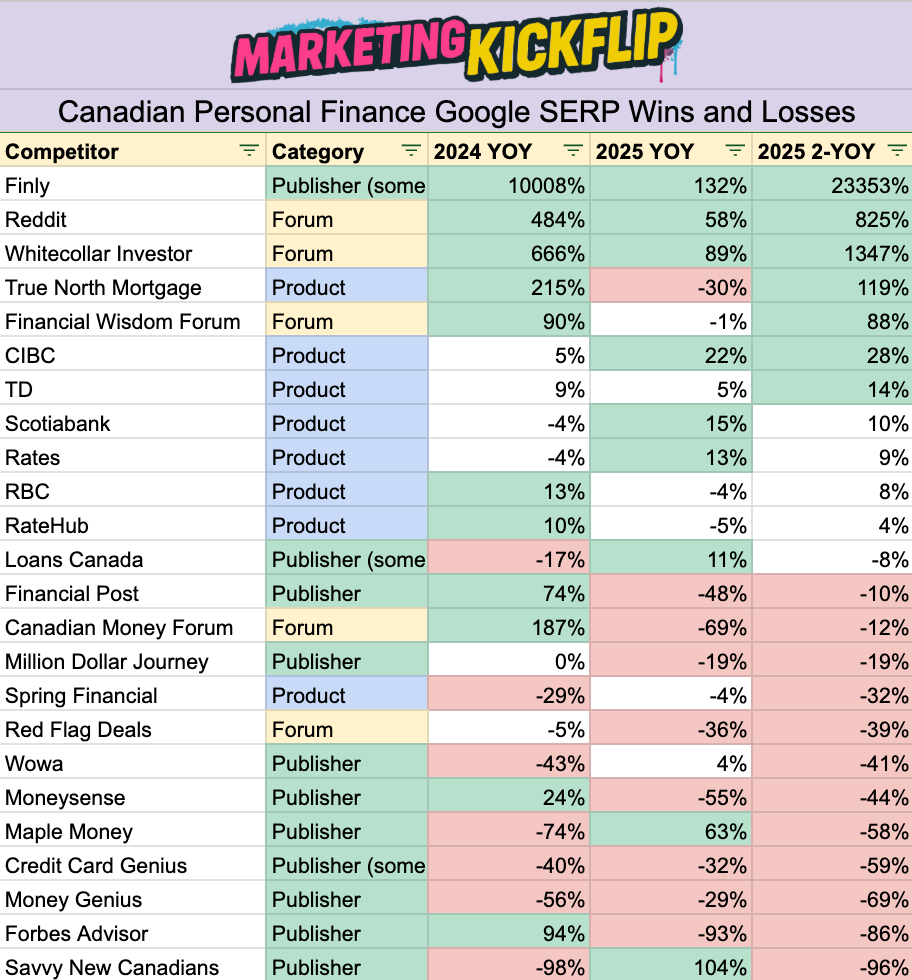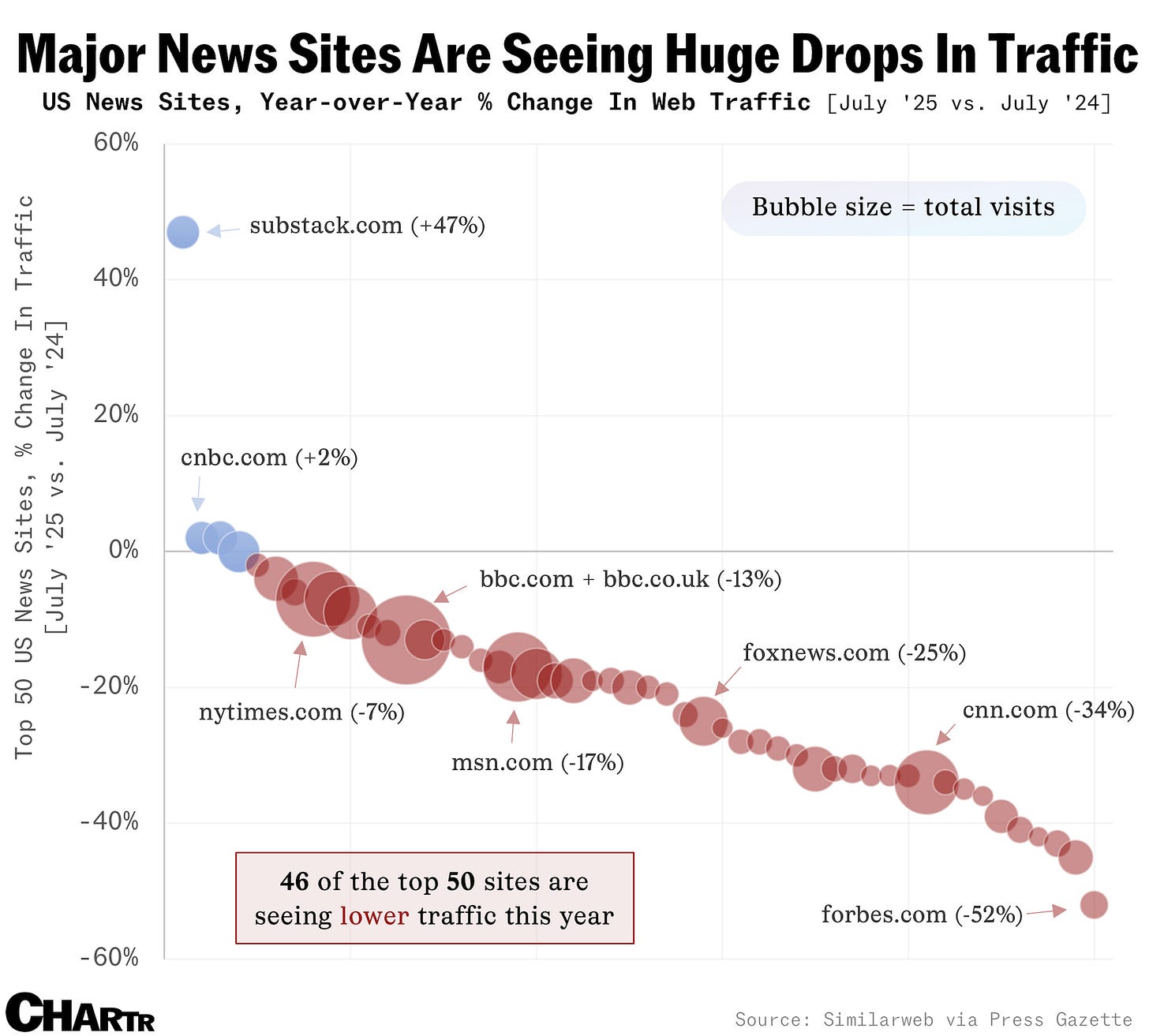The Great Publisher Purge: Google SERP Has No Room for Blogs
The SERP has spoken: product sites climb, forums fight, publishers fade.
According to Ahrefs, In the next month or so, it looks like Reddit will join the 1 billion organic users club. That got me thinking about an analysis I did earlier this summer to see who the biggest winners and losers were in the finance space.
Two years ago, on August 25, 2023, Google released the Helpful Content Update. It promised to reward “people-first” content. It punished low quality, SEO-first writing.
It’s the biggest update since the Panda update in 2011 and, to me, it is now obvious why. Google intends to use the SERP as a product/form focus and move publishers to the Discover and News platforms. I can only assume this is an attempt to clean up the SERP from affiliate-publisher websites like Capterra that target ‘best’ keywords but bring users to paid affiliate top-lists and fail to provide a true answer about what is ‘best’.
As a result, when I look at the SERPs today, the winners and losers are obvious.
⬆️ Products.
⬆️ Forums.
⬇️ Publishers.
Each has been impacted differently.
Products Are Winning
Product websites are doing better since the Helpful Content Update. Most SEOs know this. The numbers back it up.
In the analysis below, I analyzed the organic traffic (Ahrefs) from the most notable Canadian Personal Finance websites. I looked at September 2023 vs September 2024 and 2025. The chart is sorted by largest increase in traffic to smallest from 2023 to 2025 (2-YOY)
Banks, credit card sites, and mortgage providers are holding steady or even gaining. If you are a business selling a product or service, you are in a stronger spot than you were three years ago.
Forums Are a Mixed Bag
Forums are trickier to judge. Some exploded in traffic. Reddit is the clearest example. In 2023 it was already massive. By 2025, it’s close to a billion visits a month. Whitecollar Investor’s forum also grew year over year.
But not every forum is winning. Canadian Money Forum is down. Red Flag Deals has lost more than a third of its traffic. Forums live and die based on engagement and community. If the conversations are active, Google rewards them. If the activity dies, so does the traffic.
Publishers Are Losing
This is where the real damage is.
Publishers have not recovered from the Helpful Content Update. It has been almost three years. Traffic is still far below pre-HCU levels.
Financial Post, for example, had a great 2024. They doubled their search traffic that year. But in 2025, they lost almost half of it again. Loans Canada is flat. Moneysense is down more than 50% year over year. Forbes Advisor Canada is down over 90%. Savvy New Canadians lost almost all of their organic traffic.
According to Similarweb data, 46 of the 50 largest publishers in the world are seeing less organic traffic from Google compared to last year. The decline is so steep that publishers are starting to fight back. Penske Media Corporation, which owns Rolling Stone and Variety, has even filed a lawsuit against Google, arguing that its dominance and algorithm changes are starving publishers of the search traffic they once relied on.
Yes, a few bright spots exist. Maple Money managed a small rebound in 2025. But the overall trend is ugly.
Publishers are being pushed off the SERP.
The Shift to Discover
Where are they going? Google Discover.
I spoke with Mike Vannucci, President of Finance Buzz. He’s seeing more traffic from Discover. Many publishers are. Especially those who syndicate content through Yahoo, MSN, and other large portals.
That is the new playing field. Discover feeds are becoming the place where publishers compete for attention. It is a different game than search. It’s more like social media. Headlines matter more. Timing matters more. And the audience is far less predictable.
This is not good news for publishers. Search used to be predictable. Discover is not.
The Ranking Factor Nobody Talks About
The numbers tell the story clearly. Publisher traffic is collapsing, down 9% year over year in 2024 and then plunging another 47% in 2025. That puts publishers at a 51% loss over two years. Forums (excluding Reddit) are also sliding, down 2% in 2024 and then dropping 33% in 2025 for a total two-year decline of 35%. The only group holding strong is product websites. They grew 6% in 2024, another 10% in 2025, and are up 16% over two years. Products are thriving while publishers and forums are being erased from search.
The data also hints at something else.
To me it appears that your website category itself may be a ranking factor.
If your site is categorized as a publisher, you are swimming upstream. You can produce the best content in the world. But you won’t rank for bottom of funnel keywords if Google thinks you are a publisher. Those spots are reserved for product sites.
This is a scary thought for anyone building a media business. It suggests that your category limits your ceiling.
The Future
So where does this leave publishers?
Stuck between Google and AI.
Google is moving them off the SERP. AI is cutting them out of top of funnel. And Discover is not a stable replacement.
The only path forward for publishers might be deeper partnerships. Syndication with large platforms like Yahoo. Strategic deals with MSN. Stronger integration into communities like Reddit. Or focusing only on highly trusted, timely data that AI needs to scrape.
But the truth is, relief is not coming. Not from Google. Not from AI. Publishers are being forced to reinvent themselves.
Two years after the Helpful Content Update, the picture is clear. Products win. Forums split. Publishers lose.
And the gap is growing.






